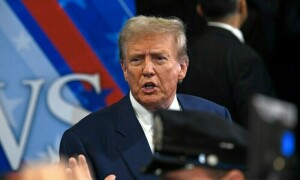Nobody puts it all together quite like Bloomberg columnist John Authers, who described the recent financial market bloodbath, in the wider geopolitical context, as: “Neither Vladimir Putin’s army, nor Hamas and the IDF (Israeli Defence Forces), could provoke quite the same terror in US stocks as an old-fashioned carry-trade unwind”.
Perhaps the gods of finance have finally revealed their plans – not that Authers implied exactly this – and triggered a ‘butterfly effect’ that suddenly threatens to squeeze liquidity out of US capital markets, gut the AI dream run on Nasdaq, and induce a recession and credit crunch that might make the 2008 crash look like a walk in the park. Bad news indeed for the Biden White House that just rushed USS Theodore Roosevelt and USS Abraham Lincoln to Iran’s doorstep as clouds of war darken over the Middle East.
For, just days after Netanyahu crossed the really really red line and green-lighted Ismail Haniyeh’s assassination in Tehran, a few completely unrelated things happened in quick succession in faraway Planet Finance that were just not supposed to happen. Tech earnings began to disappoint because fancy talk about AI wasn’t yet delivering tangible results, leading to the biggest single-day Nasdaq rout in ages and the classic domino effect tumble in equity markets across the world.
Then Warren Buffet cut his Apple stake by half in a rush to cash, prompting his diehard value-investing fan club to jump onto the bandwagon in a heartbeat. And the Bank of Japan (BoJ) decided to raise interest rates and reduce bond purchases, unwinding its long 17-year cycle of quantitative easing, sending the yen skyrocketing and unravelling the multi trillion-dollar international yen carry trade.
Carry trade is a classic interest rate arbitrage play, borrowing in a low interest rate currency and investing in a high yield ones, and Japan’s long history of negative and near-zero interest rates provided the ideal gush of money for investors to leverage – literally, since carry trades are also among the highest-leveraged ones in international finance – and literally print money in high interest rate markets like the US (where most of it went into the tech sector joyride), Mexico, New Zealand, etc.
But by their very nature carry trades are volatility selling trades, meaning they require low volatility and a deep status quo to ensure profits, which is what everybody was counting on because BoJ was not supposed to raise rates ever, just like the tech sector surge was supposed to go on forever. Now, however, the slightest rate rise by BoJ has led to margin calls and wiped out trillions of dollars from international markets, spiking volatility and swinging the market pendulum sharply back from greed to fear.
Speculators that got their fingers burnt in the Fri-Mon crash naturally took the “turnaround Tuesday” rebound as the market’s back-to-business signal after an “overdue correction”. Yet it’s more likely that the potential depth and reach of the yen carry trade “great unwind” merit another nugget from financial market lingo – the “dead cat bounce”, the small uptick that regularly follows a big fall, like a dead cat thrown off a rooftop bouncing after hitting the floor. S&P500 ended higher for the week that saw the death of Lehman Brothers in 2008, after all, so one bounce does not tell much historically.
JP Morgan economists believe that the “great unwind” is only half done so far, and much more trauma lies ahead as investors liquidate their positions from Latin America to Down Under to frantically cover their bleeding yen shorts. Let’s not forget that this happened just when US jobs and unemployment and manufacturing data revealed disappointing trends and a sagging economy, leading to very harsh criticism that the Fed has pushed its hard money pivot too long, and now the soft landing dream is turning into a hard landing nightmare.
It’s also led to desperate calls for an emergency inter-meeting cut, well before September. But Jerome Powell will only resurrect Greenspan’s “Fed put” if a major institution – big bank or hedge fund – comes in danger of falling before the unwind is done. So far, that has not happened, so there’s little chance of the Fed going off course. Regardless, US and European interest rates are set to decline just when BoJ is turning hawkish, which means a further squeeze in the interest rate spread and a faster unwinding of what is left of the carry trade. That explains why some observers are cautioning that an emergency cut might do more bad than good.
Should this unwind reveal more time bombs hidden deep in Big Money books – since forex market activity is not recorded like equity and bond markets – and a credit crunch really descend on the US market, inducing the first post-Covid recession, then it’s not too hard to imagine what more, completely unnecessary volatility from an inevitable war in the Middle East will do to financial markets and the headaches it will cause in the White House so close to the election.
If only the gods of finance had put their cards on the table before Mossad took out Haniyah, perhaps Joe Biden would have gone further than his verbal rebuke to Netanyahu during a heated phone call – “don’t bulls**t me, Bibi” – and leaned a lot more heavily on him to come to his senses.
Copyright Business Recorder, 2024
The writer can be reached at jafry.shahab@gmail.com























Comments
Comments are closed.